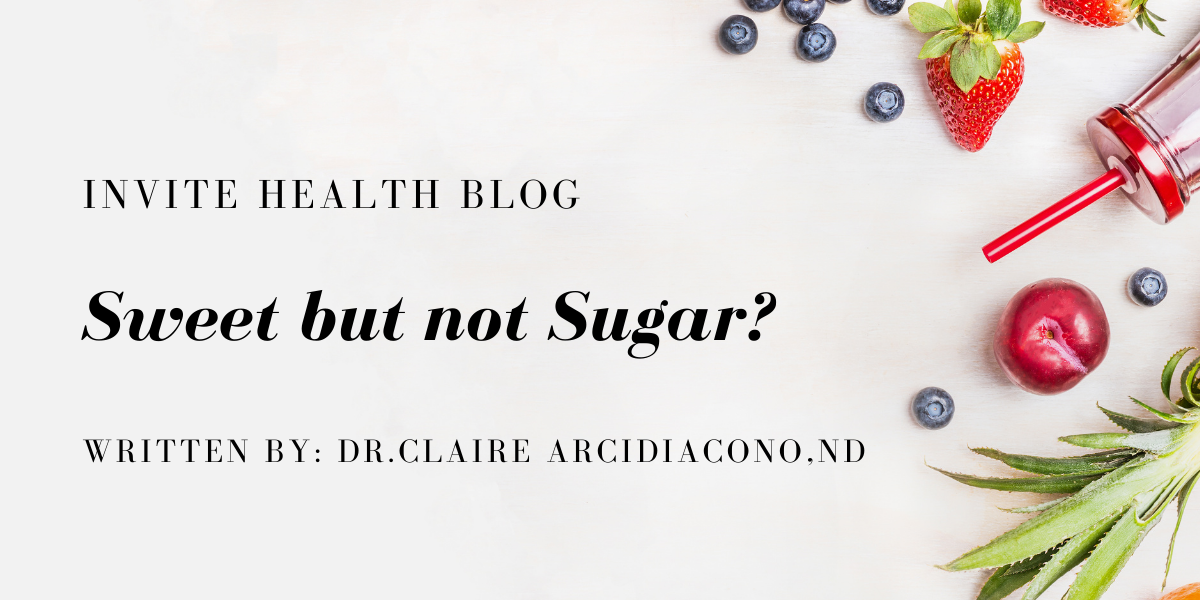Sweet but not Sugar?

Written by: Claire Arcidiacono, ND
For further questions or concerns email me at carcidiacono@invitehealth.com†
In our modern world we have many alternatives to sugar. These alternatives include artificial sweeteners and those that are considered natural sweeteners. In this blog I will be going over sugar substitute’s not actual sugar. For more information on sugar it please see my prior blog on sugar. Before I get into sugar alternatives I want to point out that while Agave, molasses and honey are considered by some to be healthy sugar alternatives they are actually still sugar. While they may be a better choice for some for those looking to lower their sugar intake they are not an alternative solution since they are still sugar.†
Artificial sweeteners are those that are made by extracting plant compounds or by using chemicals to form a sweet compound. Artificial sweeteners include aspartame, saccharin, sucralose and cyclamate. Typically when we think of artificial sweeteners we tend to think of those that are made in a lab or modified in a lab setting. And while this is not exact it can be helpful to think of them that way. “Over the counter” names for common artificial sweeteners include Equal, Sweet “n” Low and Splenda. (1) Those that are considered “natural” alternative sweeteners are usually extracted directly from plants. The most common of these include Xylitol, Stevia and Monk fruit.† (2)
Now I’m sure we have all heard about the side effects of artificial sweeteners but are there any benefits? Well some studies have shown that there is a potential for benefits when it comes to weight loss and helping improving fasting blood glucose. Side effects while not proven 100% have been found in studies to occur in some individuals that use these items. While as I said the following are not proven without a doubt the fact that the data suggests these do happen is concerning. Some data has found that artificial sweeteners can cross the blood-brain barrier and can in the long run affect appetite leading to an increase in food intake. Data has also found that artificial sweeteners can cause your taste buds to become accustomed to ultra-sweet flavors. In other words your taste buds are so used to super sweet that you can no longer even recognize mild sweet such as found in fruit. Additionally some studies have found that artificial sweeteners can affect bacteria in the gut leading to an increase risk of insulin resistance, diabetes, obesity and metabolic syndrome. Studies have also found that artificial sweeteners are linked to many different digestive issues such as IBS. In other words artificial sweeteners both decrease our immune system and increase our risk for chronic inflammatory disorders. Aspartame in particular cannot be consumed by anyone with Phenylketonuria. Unfortunately in this blog I just didn’t have the space to put all the potential side effects of artificial sweeteners. If I had tried we would be here for a very long time. So I just put the most common.† (3)
SIDE EFFECTS OF ARTIFICIAL SWEETENERS
Now natural alternative sweeteners have some potential side effects, however in clinical practice I have found that they tend to be pretty rare. However, just like with anything it is possible to overdo it. Sugar alcohols such as Xylitol in high amounts may have a laxative affect. (4)Stevia may cause bloating, nausea, dizziness and numbness. (5) So far Monk fruit only appears to cause allergy type side effects for those that are allergic to it.† (6)
Now unlike with artificial sweeteners where the benefits aren’t very varied natural sweeteners have a variety of benefits. Xylitol and Stevia have both been found to help improve bone health which is why Invite use’s Stevia in our Bone powder and Collagen Hx! Xylitol is very helpful when it comes regulating bacteria especially in the mouth. This is why Invite uses it in our periodontal lozenges and even our Chew-able Coq10! Back to Stevia it is associated with decreasing blood sugar levels. Monk fruit contains an antioxidant which has been found to be anti-inflammatory. And of course natural sugar alternatives are helpful for those who wish to lower their sugar intake either because of family history or personal medical history. (7) I always tell people that prevention is key. It is much better to avoid a problem than to try and correct it later. One way to help stay healthy is to use natural sweeteners which is what Invite does to help us stay healthy.†
INVITE’S SOLUTIONS TO THAT SWEET TOOTH CRAVINGS
- Whey Vanilla by Invite is naturally sweet and can be used as a “natural creamer and sweetener” in all sorts of ways. Not only will it add a natural sweetness it will add protein and essential amino acids!†
- Let’s make some fancy coffee! To your blender cup add ice, coffee, 1 scoop Invite vanilla whey and 1 scoop Cocoa Hx. Blend and serve. The more ice you add the less strong the coffee is. So if you want it strong add less ice.†
- Don’t feel like chocolate today but still want a fancy blender coffee? Feel free to substitute cinnamon powder for the Cocoa Hx. If you add pumpkin pie spice it becomes a homemade holiday drink!†
- For an added kick you can add 1 dropper full of white tea and 1 dropper full Blue Granate Tx.†
- Whey can even be mixed into warm coffee and tea. In fact if you make a cup of Earl gray tea, add 1 scoop Vanilla whey and a few extra drops vanilla it becomes similar to a new drink I’ve found called A London fog!†
- D Ribose while not normally considered a sugar alternative is a naturally occurring sweet molecule that can be used to sweeten different things!†
Next week well be concluding our series on blood sugar.†
For further questions or concerns email me at carcidiacono@invitehealth.com†
REFERENCES
1. https://www.healthline.com/nutrition/artificial-sweeteners-good-or-bad#types
2. https://www.mayoclinic.org/healthy-lifestyle/nutrition-and-healthy-eating/in-depth/artificial-sweeteners/art-20046936
3.https://www.eatthis.com/artificial-sweeteners-side-effects/
4. https://www.mayoclinic.org/healthy-lifestyle/nutrition-and-healthy-eating/in-depth/artificial-sweeteners/art-20046936
5.https://www.webmd.com/vitamins/ai/ingredientmono-682/stevia
6.https://www.healthline.com/health/food-nutrition/monk-fruit-health-benefits
7.https://www.medicinenet.com/what_is_the_best_alternative_to_sugar/article.htm


